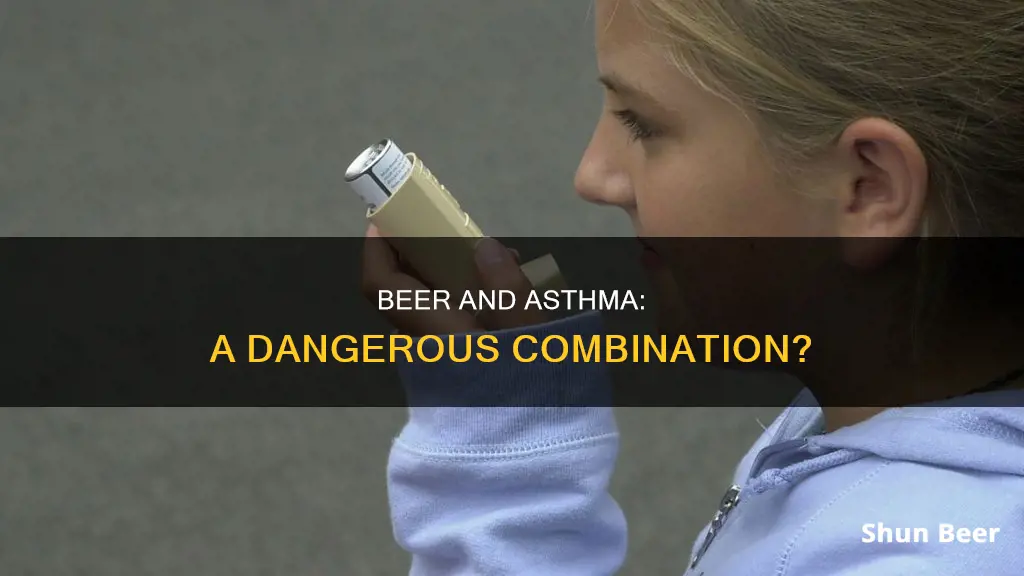
Alcohol consumption can trigger asthma attacks in some people. A study by The Journal of Allergy and Clinical Immunology found that 33% of participants experienced an asthma attack after drinking alcohol, with wine being the most common trigger. Beer and whisky were also found to worsen asthma symptoms. The reason for this may be due to the presence of histamines and sulfites in alcoholic drinks, which can cause allergic reactions and are known asthma triggers. However, there is limited scientific evidence on the link between alcohol and asthma, and not all asthmatics will be affected by drinking alcohol.
| Characteristics | Values |
|---|---|
| Alcohol's effect on asthma | Alcohol can trigger asthma attacks in some people. |
| Alcohol's effect on the body | Alcohol can cause acid reflux, which can lead to an asthma attack. |
| Alcohol's indirect effect on asthma | Alcohol can worsen asthma symptoms by increasing stress and negatively affecting sleep, exercise, and school or work attendance. |
| Asthma triggers | Common asthma triggers include air irritants, allergens, medications, and weather extremes. |
| Alcohol's role as an asthma trigger | Alcoholic drinks, particularly wine, contain sulfites and histamines, which can trigger asthma attacks. |
| Sulfites | Sulfites are preservatives found in wine, beer, and cider. They are produced naturally during the fermentation process and are added to prevent bacterial growth. |
| Histamines | Histamines are chemicals released during an allergic reaction and are also found in alcoholic drinks. |
| Study findings | One study found that 33% of participants experienced asthma attacks triggered by alcohol, with wine being the most common culprit. |
| Recommended drinks for asthmatics | Clear spirits like gin and vodka contain lower levels of sulfites and histamines but may not be safe for all asthmatics. |
| Lowering risk | Asthmatics should choose drinks wisely, monitor symptoms, and carry a reliever inhaler when drinking alcohol. |
What You'll Learn
- Beer contains histamines, which can trigger an asthma attack
- Sulfites in beer can cause an allergic reaction, leading to an asthma attack
- Alcohol can cause acid reflux, which can lead to an asthma attack
- Drinking alcohol may heighten anxiety, a common asthma trigger
- Alcohol can make people more sensitive to other asthma triggers, like pollen

Beer contains histamines, which can trigger an asthma attack
Histamines are known to trigger asthma attacks, and alcoholic drinks are no exception. A study published in The Journal of Allergy and Clinical Immunology found that 33% of participants reported that alcohol had triggered an asthma attack on at least two occasions. Wine was found to be the most common culprit, but beer was also listed as one of the main offenders. The same study also highlighted histamines as a potential allergen contributing to asthma attacks.
The amount of histamine in beer depends on the brewing method and the type of yeast used. Bottom-fermented beers, such as pilsners and lagers, are produced with bottom-fermenting yeast at lower temperatures, resulting in lower histamine levels. On the other hand, top-fermented beers, such as pale ales and IPAs, are produced with top-fermenting yeast at higher temperatures, leading to higher histamine levels. Spontaneously fermented beers, which use wild yeast and lactic acid bacteria, can also contain dangerous levels of histamine.
While not everyone with asthma will experience an attack from drinking beer, it is important for individuals with asthma to be aware of their triggers and take steps to prevent an attack. If you have asthma and notice that drinking beer triggers your symptoms, it may be best to avoid it altogether or opt for low-histamine alcoholic options. Additionally, it is crucial to always have your inhaler with you and seek medical attention if you experience any breathing difficulties.
Hoppy Beer and IBS: A Safe Pairing?
You may want to see also

Sulfites in beer can cause an allergic reaction, leading to an asthma attack
Drinking beer can trigger asthma in some people. While there is little scientific evidence of a link between alcohol and asthma, a study published in The Journal of Allergy and Clinical Immunology found that alcohol had triggered an asthma attack on at least two occasions in 33% of people. The study also found that wine was the most common drink to induce symptoms, and that most alcohol-related asthma symptoms started within an hour of drinking alcohol.
Sulfites are a group of sulfur-containing compounds that occur naturally in some foods and beverages, such as wine and beer. They are also added to various foods and drinks as preservatives. Sulfites can cause a range of symptoms in people with sulfite allergies, including upset stomach, diarrhea, vomiting, and a drop in blood pressure. In rare cases, sulfite allergies can lead to anaphylaxis, a potentially life-threatening whole-body allergic reaction.
People with asthma are more likely to have reactions to sulfites, and up to 10% of people with asthma are sensitive to these additives. If you have asthma and suspect you may have a sulfite allergy, it is important to see a doctor for testing and advice. Avoiding sulfites can be challenging, as they are present in many foods and drinks, but your doctor can provide guidance on how to manage your asthma and reduce the risk of a sulfite-induced asthma attack.
Beer and Breastfeeding: Is It Safe to Drink Alcohol?
You may want to see also

Alcohol can cause acid reflux, which can lead to an asthma attack
A study by The Journal of Allergy and Clinical Immunology found that 33% of participants suffered an asthma attack after consuming alcohol. Their attacks ranged from mild to moderate. This indicates that about 1 in 3 adults with asthma should consider monitoring their alcohol consumption.
Wine, beer, and whisky have been identified as the main offenders when it comes to triggering asthma symptoms. Wine contains a preservative called sulfite, which helps to preserve its freshness and prevent it from turning brown. Sulfites often cause allergic reactions in people, particularly those in or near middle age. Although serious reactions are rare, sulfite allergy symptoms can range from wheezing to anaphylaxis. This sulfite allergy could trigger an asthma attack.
Beer and wine also contain higher levels of histamines, which are produced when alcohol ferments. Histamines are known to cause problems for people with allergies, especially those with asthma.
Clear spirits such as gin and vodka contain lower levels of sulfites and histamines, but this does not mean they are safe for everyone with asthma. It is important to note that individual triggers can vary, and the best way to determine if alcohol is an asthma trigger is to monitor symptoms in correlation with alcohol consumption.
Beer Olympics: Competitive Drinking Games Explained
You may want to see also

Drinking alcohol may heighten anxiety, a common asthma trigger
Alcohol consumption can have a direct effect on asthma symptoms, and in some cases, it can trigger a full-blown asthma attack. While triggers vary from person to person, studies have shown that drinking alcohol can heighten anxiety, which is a common trigger for asthma attacks.
Anxiety is a feeling of worry, nervousness, or unease, often about an imminent event or something with an uncertain outcome. For people with asthma, anxiety can be a significant trigger for an attack. The rapid breathing that often accompanies anxiety can further increase the likelihood of an asthma attack.
Alcohol can have a complex effect on anxiety levels. For some people, drinking alcohol in moderation may help reduce feelings of anxiety, especially in social situations. However, consuming large amounts of alcohol is more likely to heighten anxiety. This heightened anxiety, in turn, may trigger an asthma attack.
Additionally, drinking alcohol can indirectly contribute to asthma attacks by worsening other complications associated with the condition. Asthma can affect sleep, exercise, and attendance at work or school. If alcohol consumption exacerbates these issues, it may further increase the likelihood of an asthma attack.
It is important to note that not everyone with asthma experiences asthma attacks triggered by alcohol consumption. Individual triggers vary, and some people may find that certain types of alcoholic beverages are more likely to trigger an attack. However, due to the potential link between alcohol and heightened anxiety, it is advisable for people with asthma to monitor their alcohol consumption and be aware of their personal triggers.
Daytona Beach Beer Rules: What You Should Know
You may want to see also

Alcohol can make people more sensitive to other asthma triggers, like pollen
Alcohol consumption can have a direct effect on asthma symptoms. According to a study by The Journal of Allergy and Clinical Immunology, 33% of participants reported that alcohol had triggered an asthma attack on at least two occasions. While the exact mechanism is not fully understood, researchers have identified two components in alcoholic beverages that could be responsible: sulfites and histamines.
Sulfites are preservatives commonly used in wine and beer production to prevent bacterial growth and maintain freshness. However, they are known to cause allergic reactions in some individuals, particularly those with asthma. The symptoms of a sulfite allergy can range from mild, such as wheezing, to severe anaphylaxis. As an allergic reaction can trigger asthma, sulfites in alcoholic drinks could indirectly contribute to asthma attacks.
Histamine is another chemical that is naturally present in alcohol due to the fermentation process. When allergens enter the body, the immune system releases histamine, leading to an allergic reaction. Alcoholic beverages contain histamine-like chemicals that the body may misinterpret as histamines, causing an asthma trigger response.
While the link between alcohol and asthma is not yet fully understood, it is clear that alcohol can increase sensitivity to other asthma triggers. For example, drinking alcohol may make individuals more susceptible to allergens like pollen. This heightened sensitivity could be due to the presence of histamine-like chemicals in alcohol, which can lower the threshold for an asthma attack.
Therefore, while alcohol itself may not be the sole cause of an asthma attack, it can indirectly contribute to asthma symptoms by increasing sensitivity to other triggers, such as pollen. It is important for individuals with asthma to be aware of this potential risk and monitor their alcohol consumption accordingly.
BeerSmith Compatibility: Apple Devices and Beyond
You may want to see also
Frequently asked questions
Beer contains sulphites and histamines, which can trigger asthma symptoms. However, there is limited scientific evidence of a link between alcohol and asthma.
Sulphites are preservatives used to stop bacteria growth and preserve freshness. Histamines are chemicals released by the immune system during an allergic reaction.
Common symptoms include coughing, wheezing, and general shortness of breath.
Asthma symptoms can appear within an hour of drinking alcohol. However, some people may experience symptoms after just a few sips, while others can have one or two drinks without any issues.
Clear spirits such as gin and vodka contain lower levels of sulphites and histamines. However, they should still be consumed with caution as they may not be safe for everyone with asthma.







